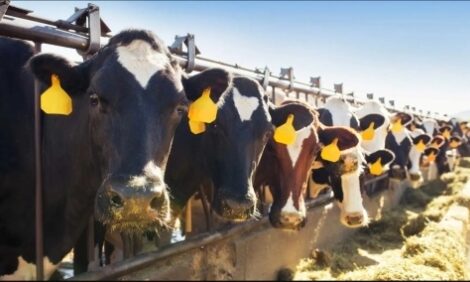



Worries Raised Over Zilmax Audit
US - A feedlot specialist has voiced concerns over the value of cattle audits being undertaken as part of Merck’s five-step plan to assess the risk of feeding Zilmax.Professor Chris Reinhardt, Extension Feedlot Specialist at Kansas State University has stated that, in his opinion, an insufficient data set and a change in weather conditions into autumn could threaten monitoring validity.
This follows Merck Animal Health’s suspension of its beta-agonist growth promoter Zilmax on 16 August this year.
Tyson Foods initially blew the whistle on 7 August, announcing the suspension of Zilmax-fed cattle, which then came into force on 6 September.
A letter distributed to the company’s feeders stated sightings of ‘non-ambulatory’ cattle had been observed and that animal health consultants had suggested the growth promoter could be a cause.
*
"With the plants not accepting cattle and the product not being available right now, there just isn’t the population of animals to audit"
Speaking last week on a Kansas State University Webinar, Professor Reinhardt, explained that the lameness seen in cattle is now being described within the industry as a ‘reluctance to move’.
He outlined the industry is looking at five potential interlinking factors that, to the best of his knowledge, are being evaluated as part of Merck’s five step-plan to clarify the reluctance issue seen in a ‘small percentage’ of feedlot cattle.
Cattle weight, additional feed days, the colour of an animal, extreme heat events and the presence or absence of a beta-agonist are the factors that Professor Reinhardt has ascertained as the ‘complicating factors’ Merck is assessing.
To this end, Merck’s plan is to follow Zilmax-fed cattle from feedyards to the plant as an epidemiological audit.
However, there are two problems with this system. Firstly, there aren’t enough cattle still fed Zilmax within the beef sector, and secondly; autumnal weather means heat stress may be difficult to evaluate.
“The problem as I see it is that with the plants not accepting cattle and the product not being available right now, there just isn’t the population of animals to audit,” said Professor Reinardt.
“The other thing that is lacking is heat,” he added. “Two of the things that experts would have liked to have evaluated, do not exist right now.”
But, beta-agonists have been on the ‘radar of concern’ before, during hot summers on the High Plains.
“The extreme heat we had in 2011, 2012 and, to a lesser extent in 2013, led to greater than expected late-term mortality in cattle,” said Professor Reinhardt.
Meanwhile, Optaflexx (Ractopamine Hydrochloride) has been the remaining growth promoter option following Merck’s decision to suspend sales on 16 August.
Like Zilmax, Optaflexx is a beta-agonist designed to be fed over the final month of feeding, resulting in over 15lbs of lean muscle gain. In 2004, Elanco launched Optaflexx - three years before Zilmax hit the market.
The cattle industry’s acceptance of the technology was widespread. Professor Reinhardt said last year, 70 per cent of feedlot cattle were receiving beta-agonists.
He also reiterated that, while Zilmax is similar to Optaflexx, the other widely used product in the industry, it is chemically very different.
Speaking on K-State radio Mr Reinhardt said: “They are different compounds; they are even different subclasses of compound within the broader category of beta-agonist.”
The webinar addressed how the two products function, and described how Optaflexx is suited to binding to Beta one - present in greater quantities in pigs - and Zilmax to Beta two - seen more in cattle.
This difference is important to note, added Professor Reinhardt, saying that oversimplifying complex technical issues is problematic and frequently done when dealing within food safety.
However, he stressed the concern, while prompting a degree of debate, did not actually impact on the consumer in any way.
Michael Priestley
News Team - Editor
Mainly production and market stories on ruminants sector. Works closely with sustainability consultants at FAI Farms



